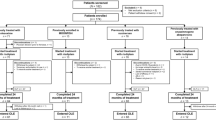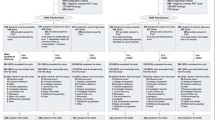Abstract
Objective
The aim of this report was to systematically evaluate the efficacy and safety of rasagiline (R) plus levodopa (l) (R + l) for the treatment of Parkinson’s disease (PD) compared with that of l monotherapy, in order to provide a reference resource for rational drug use.
Methods
Randomized controlled trials (RCTs) of R + l for PD published up to September 2018 were searched. Sensitivity analyses were also performed.
Results
Fourteen RCTs with 2531 participants were included. Compared with l monotherapy, the pooled effects of R + l combination therapy on unified Parkinson’s disease rating scale (UPDRS) score were (SMD − 0.50, 95% CI − 0.70 to − 0.30, P < 0.00001) for UPDRS motor score, (SMD − 0.59, 95% CI − 0.79 to − 0.39, P < 0.00001) for UPDRS activities of daily living (ADL) score, (SMD − 0.65, 95% CI − 0.81 to − 0.49, P < 0.00001) for UPDRS total score. R + l combination therapy was better than l monotherapy in reducing daily off-time (SMD − 1.15, 95% CI − 2.13 to − 0.17, P = 0.02), but there was a statistically nonsignificant result in daily on-time increase (SMD 1.39, 95% CI − 0.69 to 3.48, P = 0.19). There were no statistical differences in number of adverse events (OR 1.33, 95% CI 0.97 to 1.82, P = 0.07) and number of dropout (OR 0.88, 95% CI 0.65 to 1.19, P = 0.39) between R + l combination therapy and l monotherapy.
Conclusions
R + l combination therapy was superior to l monotherapy for improvement of UPDRS scores and off-time in PD patients. Moreover, R + l combination therapy and l monotherapy were similar in terms of safety and tolerability.






Similar content being viewed by others
References
Venkateshappa C, Harish G, Mythri RB, Mahadevan A, Bharath MM, Shankar SK (2012) Increased oxidative damage and decreased antioxidant function in aging human substantia nigra compared to striatum: implications for Parkinson’s disease. Neurochem Res 37(2):358–369
Ikeda K, Yoshikawa S, Kurokawa T, Yuzawa N, Nakao K, Mochizuki H (2009) TRK-820, a selective kappa opioid receptor agonist, could effectively ameliorate L-DOPA-induced dyskinesia symptoms in a rat model of Parkinson’s disease. Eur J Pharmacol 620(1–3):42–48
Cheung C, Bhimani R, Wyman JF, Konczak J, Zhang L, Mishra U, Terluk M, Kartha RV, Tuite P (2018) Effects of yoga on oxidative stress, motor function, and non-motor symptoms in Parkinson’s disease: a pilot randomized controlled trial. Pilot Feasibility Stud 4:162
Nagatsua T, Sawadab M (2009) L-dopa therapy for Parkinson’s disease: past, present, and future. Parkinsonism Relat Disord 15(Suppl 1):S3–S8
Marsili L, Marconi R, Colosimo C (2017) Treatment strategies in early Parkinson’s disease. Int Rev Neurobiol 132:345–360
Bendi VS, Shou J, Joy S, Torres-Russotto D (2018) Motor fluctuations and levodopa-induced dyskinesias in dopa-responsive dystonia. Parkinsonism Relat Disord 50:126–127
Szökő É, Tábi T, Riederer P, Vécsei L (2018) Pharmacological aspects of the neuroprotective effects of irreversible MAO-B inhibitors, selegiline and rasagiline, in Parkinson’s disease. J Neural Transm (Vienna) 125(11):1735–1749
Robakis D, Fahn S (2015) Defining the role of the monoamine oxidase-B inhibitors for Parkinson’s disease. CNS Drugs 29(6):433–441
Youdim MB, Gross A, Finberg JP (2001) Rasagiline [N-propargyl-1R(+)-aminoindan], a selective and potent inhibitor of mitochondrial monoamine oxidase B. Br J Pharmacol 132(2):500–506
McCormack PL (2014) Rasagiline: a review of its use in the treatment of idiopathic Parkinson’s disease. CNS Drugs 28(11):1083–1097
Youdim MB, Bar Am O, Yogev-Falach M, Weinreb O, Maruyama W, Naoi M, Amit T (2005) Rasagiline: neurodegeneration, neuroprotection, and mitochondrial permeability transition. J Neurosci Res 79(1–2):172–179
Magyar K, Stocchi F, Fossati C, Torti M (2015) Rasagiline for the treatment of Parkinson’s disease: an update. Expert Opin Pharmacother 16(14):2231–2241
Pistacchi M, Martinello F, Gioulis M, Zambito Marsala S (2014) Rasagiline and rapid symptomatic motor effect in Parkinson’s disease: review of literature. Neurol Ther 3(1):41–66
Weinreb O, Amit T, Sagi Y, Drigues N, Youdim MB (2009) Genomic and proteomic study to survey the mechanism of action of the anti-Parkinson’s disease drug, rasagiline compared with selegiline, in the rat midbrain. J Neural Transm (Vienna) 116(11):1457–1472
Hattori N, Takeda A, Takeda S, Nishimura A, Kitagawa T, Mochizuki H, Nagai M, Takahashi R (2019) Rasagiline monotherapy in early Parkinson’s disease: a phase 3, randomized study in Japan. Parkinsonism Relat Disord 60:146–152
Barone P, Santangelo G, Morgante L, Onofrj M, Meco G, Abbruzzese G, Bonuccelli U, Cossu G, Pezzoli G, Stanzione P, Lopiano L, Antonini A, Tinazzi M (2015) A randomized clinical trial to evaluate the effects of rasagiline on depressive symptoms in non-demented Parkinson’s disease patients. Eur J Neurol 22(8):1184–1191
Frakey LL, Friedman JH (2017) Cognitive effects of rasagiline in mild-to-moderate stage Parkinson’s disease without dementia. J Neuropsychiatry Clin Neurosci 29(1):22–25
Moher D, Liberati A, Tetzlaff J, Altman DG, The PRISMA Group (2009) Preferred reporting items for systematic reviews and meta-analyses: the PRISMA statement. PLoS Med 6(7):e1000097
Jadad AR, Moore RA, Carroll D, Jenkinson C, Reynolds DJ, Gavaghan DJ, McQuay HJ (1996) Assessing the quality of reports of randomized clinical trials: is blinding necessary? Control Clin Trials 17(1):1–12
Moher D, Pham B, Jones A, Cook DJ, Jadad AR, Moher M, Tugwell P, Klassen TP (1998) Does quality of reports of randomised trials affect estimates of intervention efficacy reported in meta-analyses? Lancet 352(9128):609–613
Jiang DQ, Zhao SH, Li MX, Jiang LL, Wang Y, Wang Y (2018) Prostaglandin E1 plus methylcobalamin combination therapy versus prostaglandin E1 monotherapy for patients with diabetic peripheral neuropathy: a meta-analysis of randomized controlled trials. Medicine (Baltimore) 97(44):e13020
Higgins JP, Thompson SG (2002) Quantifying heterogeneity in a meta-analysis. Stat Med 21(11):1539–1558
Parkinson Study Group (2005) A randomized placebo-controlled trial of rasagiline in levodopa-treated patients with Parkinson disease and motor fluctuations: the PRESTO study. Arch Neurol 62(2):241–248
Han Z (2016) Evaluate efficacy and safety of rasagiline mesylate tablets in treatment of idiopathic Parkinson’s disease in the basis of treatment of levodopa. Dissertation, Shanxi Medical University
Hanagasi HA, Gurvit H, Unsalan P, Horozoglu H, Tuncer N, Feyzioglu A, Gunal DI, Yener GG, Cakmur R, Sahin HA, Emre M (2011) The effects of rasagiline on cognitive deficits in Parkinson’s disease patients without dementia: a randomized, double-blind, placebo-controlled, multicenter study. Mov Disord 26(10):1851–1858
Hauser RA, Stocchi F, Rascol O, Huyck SB, Capece R, Ho TW, Sklar P, Lines C, Michelson D, Hewitt D (2015) Preladenant as an adjunctive therapy with levodopa in Parkinson disease: two randomized clinical trials and lessons learned. JAMA Neurol 72(12):1491–1500
Li F, Chen M, Ma XT, Li XG, Tan H, He XY, Yuan P (2014) Efficacy and safety of rasagiline mesylate in treatment of idiopathic Parkinson’s disease with motor fluctuations: a randomized, double-blind, parallel-controlled, single-center trial. J Third Mil Med Univ 36(7):696–699
Liao PJ (2014) Clinical observation of efficacy of rasagiline mesylate combined with levodopa in the treatment of primary Parkinson’s disease with motor fluctuations. Prac J Card Cereb Pneumal Vasc Dis 22(9):78–79
Lim TT, Kluger BM, Rodriguez RL, Malaty IA, Palacio R Jr, Ojo OO, Patel S, Gujrati Y, Nutter B, Swartz C, Hennessy C, Fernandez HH (2015) Rasagiline for the symptomatic treatment of fatigue in Parkinson’s disease. Mov Disord 30(13):1825–1830
Rabey JM, Sagi I, Huberman M, Melamed E, Korczyn A, Giladi N, Inzelberg R, Djaldetti R, Klein C, Berecz G (2000) Rasagiline mesylate, a new MAO-B inhibitor for the treatment of Parkinson’s disease: a double-blind study as adjunctive therapy to levodopa. Clin Neuropharmacol 23(6):324–330
Rascol O, Brooks DJ, Melamed E, Oertel W, Poewe W, Stocchi F, Tolosa E (2005) Rasagiline as an adjunct to levodopa in patients with Parkinson’s disease and motor fluctuations (LARGO, lasting effect in adjunct therapy with rasagiline given once daily, study): a randomised, double-blind, parallel-group trial. Lancet 365(9463):947–954
Weintraub D, Hauser RA, Elm JJ, Pagan F, Davis MD, Choudhry A (2016) Rasagiline for mild cognitive impairment in Parkinson’s disease: a placebo-controlled trial. Mov Disord 31(5):709–714
Zhang L, Zhang Z, Chen Y, Qin X, Zhou H, Zhang C, Sun H, Tang R, Zheng J, Yi L, Deng L, Li J (2013) Efficacy and safety of rasagiline as an adjunct to levodopa treatment in Chinese patients with Parkinson’s disease: a randomized, double-blind, parallel-controlled, multi-centre trial. Int J Neuropsychopharmacol 16(7):1529–1537
Zhang Z, Shao M, Chen S, Liu C, Peng R, Li Y, Wang J, Zhu S, Qu Q, Zhang X, Chen H, Sun X, Wang Y, Sun S, Zhang B, Li J, Pan X, Zhao G (2018) Adjunct rasagiline to treat Parkinson’s disease with motor fluctuations: a randomized, double-blind study in China. Transl Neurodegener 7:14
Kaludercic N, Carpi A, Nagayama T, Sivakumaran V, Zhu G, Lai EW, Bedja D, De Mario A, Chen K, Gabrielson KL, Lindsey ML, Pacak K, Takimoto E, Shih JC, Kass DA, Di Lisa F, Paolocci N (2014) Monoamine oxidase B prompts mitochondrial and cardiac dysfunction in pressure overloaded hearts. Antioxid Redox Signal 20(2):267–280
Dezsi L, Vecsei L (2017) Monoamine oxidase B inhibitors in Parkinson’s disease. CNS Neurol Disord Drug Targets 16(4):425–439
Mazumder MK, Paul R, Phukan BC, Dutta A, Chakrabarty J, Bhattacharya P, Borah A (2018) Garcinol, an effective monoamine oxidase-B inhibitor for the treatment of Parkinson’s disease. Med Hypotheses 117:54–58
Kong P, Zhang B, Lei P, Kong X, Zhang S, Li D, Zhang Y (2015) Neuroprotection of MAO-B inhibitor and dopamine agonist in Parkinson disease. Int J Clin Exp Med 8(1):431–439
Hauser RA, Silver D, Choudhry A, Eyal E, Isaacson S (2014) Randomized, controlled trial of rasagiline as an add-on to dopamine agonists in Parkinson’s disease. Mov Disord 29(8):1028–1034
Cereda E, Cilia R, Canesi M, Tesei S, Mariani CB, Zecchinelli AL, Pezzoli G (2017) Efficacy of rasagiline and selegiline in Parkinson’s disease: a head-to-head 3-year retrospective case-control study. J Neurol 264(6):1254–1263
Chang Y, Wang LB, Li D, Lei K, Liu SY (2017) Efficacy of rasagiline for the treatment of Parkinson’s disease: an updated meta-analysis. Ann Med 49(5):421–434
Elmer LW (2013) Rasagiline adjunct therapy in patients with Parkinson’s disease: post hoc analyses of the PRESTO and LARGO trials. Parkinsonism Relat Disord 19(11):930–936
Stern MB, Marek KL, Friedman J, Hauser RA, LeWitt PA, Tarsy D, Olanow CW (2004) Double-blind, randomized, controlled trial of rasagiline as monotherapy in early Parkinson’s disease patients. Mov Disord 19(8):916–923
Rinaldi D, Assogna F, Sforza M, Tagliente S, Pontieri FE (2018) Rasagiline for dysexecutive symptoms during wearing-off in Parkinson’s disease: a pilot study. Neurol Sci 39(1):141–143
Stocchi F, Rabey JM (2011) Effect of rasagiline as adjunct therapy to levodopa on severity of OFF in Parkinson’s disease. Eur J Neurol 18(12):1373–1378
Elmer L, Schwid S, Eberly S, Goetz C, Fahn S, Kieburtz K, Oakes D, Blindauer K, Salzman P, Oren S, Prisco UL, Stern M, Shoulson I (2006) Rasagiline-associated motor improvement in PD occurs without worsening of cognitive and behavioral symptoms. J Neurol Sci 248(1–2):78–83
Elbers RG, Verhoef J, van Wegen EE, Berendse HW, Kwakkel G (2015) Interventions for fatigue in Parkinson’s disease. Cochrane Database Syst Rev 10:CD010925
Perez-Lloret S, Rascol O (2011) Safety of rasagiline for the treatment of Parkinson’s disease. Expert Opin Drug Saf 10(4):633–643
Funding
This study was supported by grants from the Natural Science Foundation of Guangxi Zhuang Autonomous Region of China (No. 2018GXNSFAA050002) and the Doctoral Scientific Research Foundation of Yulin Normal University of China (No. G20160006).
Author information
Authors and Affiliations
Corresponding author
Ethics declarations
Conflict of interest
The authors declare that they have no conflicts of interest.
Additional information
Publisher’s note
Springer Nature remains neutral with regard to jurisdictional claims in published maps and institutional affiliations.
Rights and permissions
About this article
Cite this article
Jiang, DQ., Wang, HK., Wang, Y. et al. Rasagiline combined with levodopa therapy versus levodopa monotherapy for patients with Parkinson’s disease: a systematic review. Neurol Sci 41, 101–109 (2020). https://doi.org/10.1007/s10072-019-04050-8
Received:
Accepted:
Published:
Issue Date:
DOI: https://doi.org/10.1007/s10072-019-04050-8




